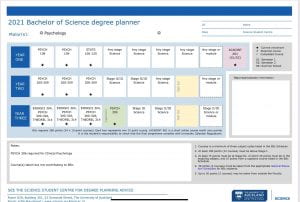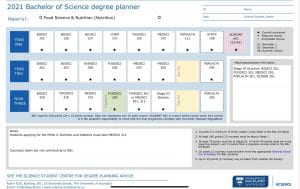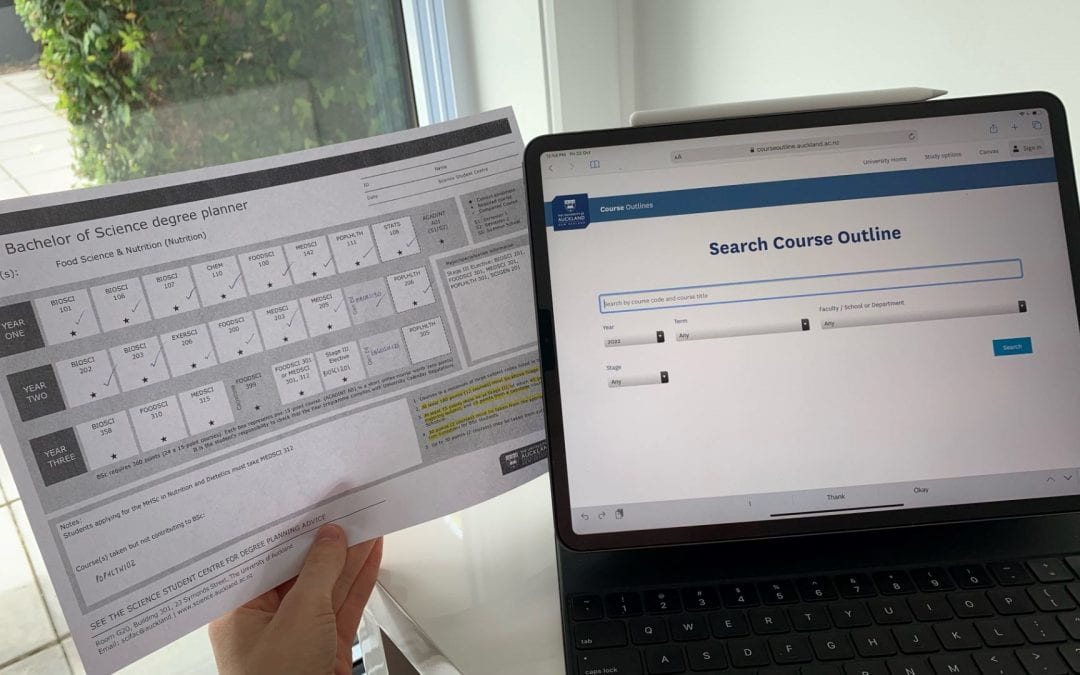I remember how exciting it was the day I was finally able to enrol in my courses. Although I don’t get much choice in my own degree, I know it can be hard to make decisions. So I hope this blog gives you some guidance.
Some university jargon I will use, if you are unfamiliar:
Paper/course: Each course you take can consist of lectures, labs, tutorials, workshops and/or seminars.
Points: These are like NCEA credits. Each course is worth a certain number of points. Most courses at the undergraduate level are worth 15 points each. If you pass the course, regardless of your final grade, you will get those 15 points. Your entire degree is made of 360 points fore most single degrees (more if you are doing a 4-year degree or a conjoint), so typically you take 24 courses.
Before you enrol in courses, these 3 resources are important to know about. I would check them out in this order:
- The degree planner
In my opinion, this the most important resource to read first. In fact, it would be useful to have this handy throughout your whole degree so you can refer to it if needed.
Basically, it gives you an outline of what your 3 years will look like.
Some important things to keep in mind
- Read the fine print! It would be devastating to get to the end of your degree only to realise you can’t graduate because you didn’t meet a simple requirement such as having a certain number of papers above Stage I
- If your degree is flexible, like the psychology one I have inserted below, you don’t necessarily need to stick to the format which they have set out for each year of your degree. For example, you could take your ‘Gen Ed’ in the first year and another ‘any stage science’ in your second year, instead of the other way around which they have suggested in that planner. You could even take a couple of papers in summer school to free up more time during the year.
- You don’t have to have your entire degree planned out before you even begin uni. In your first year you’ll experience a wide range of different topics before you narrow it down to a more specific niche in your second and third year. This will help you explore and develop your own interests.
If you’re wondering, the ‘ACADINT A01’ course in pink is a short online module which every student entering the university must take to ensure they understand the university’s academic integrity guidelines. It is pretty straightforward but I would recommend knocking it out over the summer break so you can cross one thing off your list.
As you can see by the comparison I have below, some degrees are really flexible and allow you to pick and choose your papers, whereas in other degrees you don’t get much choice at all.


2. Course outlines
https://courseoutline.auckland.ac.nz/dco
This link allows you to search up and read nearly any course’s overview of topics taught, learning outcomes, assessment structure and type of classes.
I think these course outlines are really useful for three reasons:
- They give you information on the prerequisites and what semester the paper is offered in. This is really important if you are planning out your next couple of years!
- The assessment structure is provided, with a breakdown of the types of assessment and their % weighting. Whether you prefer writing essays to taking exams, dislike group projects, or think you would thrive with practical assessments, this will help you play to your strengths.
- It can help you prepare over the summer break for what is to come and what will be expected of you.
3. Course reviews
Anyone who has taken NCEA History will be *extremely* familiar with assessing the usefulness and reliability of different sources, so you’ll probably know that personal recounts aren’t all that reliable.
The same can be said about anonymous university course reviews, which can be easily found on course review websites created by students, facebook groups, even Reddit.
Despite this, it is definitely useful to have some insight into people’s experience with a course. Just remember to have an open mind as everyone will have a slightly different experience based on their personal interests and strengths. So don’t let a bad review such as ‘impossibly hard, do not take’ instantly put you off. Speaking to past students who have similar interests to you would be a lot more useful as well.
If you really want to read these, there is no harm in doing so but I would definitely recommend reading through the course outlines first so you don’t go in with any negative assumptions. After all, the person who knows you and your interests the best will always be yourself!
Then you’re ready to enrol, yay!
It may seem like choosing your papers is a big deal! But don’t worry, you do have a couple of weeks after semester starts to change a paper if you realise you’ve made the wrong choice.
Happy enrolling!
